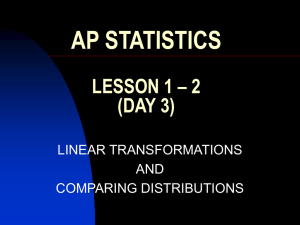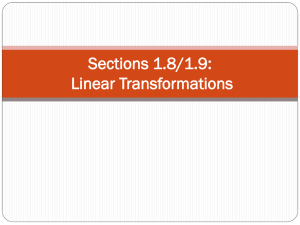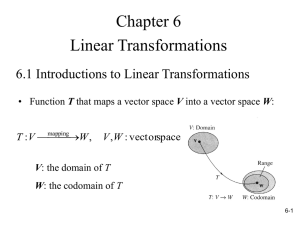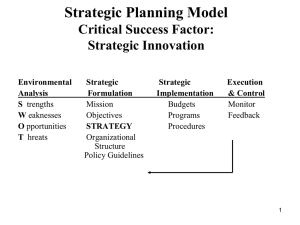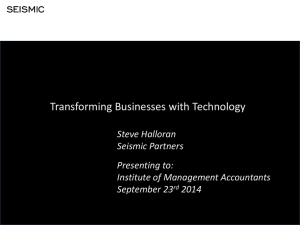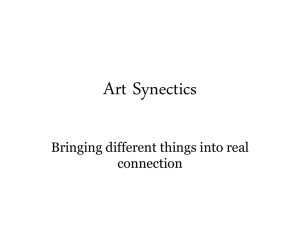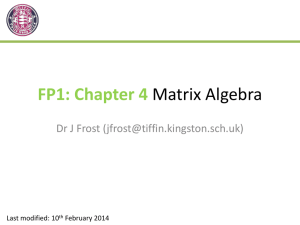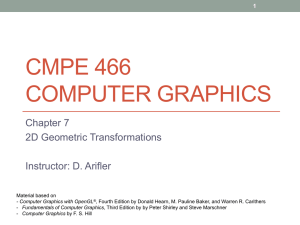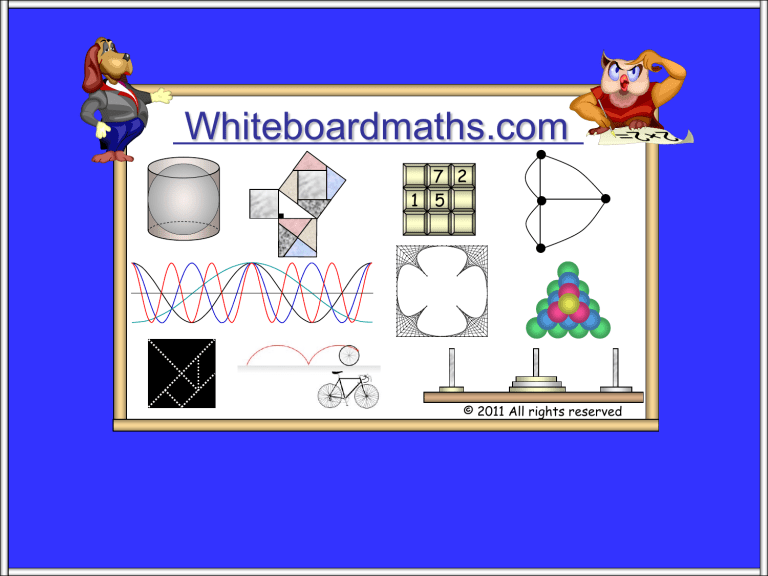
Whiteboardmaths.com
7 2
1 5
© 2011 All rights reserved
Matrix Transformations
r
8 y
A transformation can be
represented by a matrix.
6
Consider the point p(3,4) in
the plane. It can be written
as the column matrix. 3
p
4
What effect is this 2
particular matrix having
on points in the plane?
O
-8
-2
-6
-4
4
x
2
4
8
6
It produces a reflection
- 2
in the line y = x.
- 6
q’
- 8
0 1 3 4
1 0 4 3
Similarly with point q(-7,-5)
0 1 7 5
1 0 5 7
- 4
q
The point p, can be
transformed by applying a
matrix to it. For example.
P’
and with point r(-6,6)
r’
0 1 6 6
1
0
6 6
Intro
Matrix Transformations
8 y
r
s
Let us confirm this with
the triangle shown.
6
P
4
P’
2
u
-8
t
-6
-4
-2
We can write the
co-ordinates of each
vertex in a matrix like so:
s t u
2 2 5
5
1
1
x
O
2
t’
- 2
4
6
- 6
q’
- 8
t’
u’
1
1
0 1 2 2 5 5
1
0
5
1
1
2
2
5
s’
0 1
produces
1
0
- 4
q
0 1
Applying 1 0 gives
8
s’
The matrix
a reflection in the line y = x
u’
r’
Matrix Transformations
8 y
r
s
If a matrix A, transforms an
object then the inverse
matrix A-1 will map the image
back onto the original object.
6
P
4
P’
2
u
-8
t
-6
-4
-2
In our example if A
s’ t’ u’
1
1
0 1 5
1
0
2
2
5
Evaluate
x
O
2
t’
- 2
4
8
6
s’
- 6
q’
- 8
2 2 5
5
1
1
In this particular case A = A-1
s’
t’
u’
1
1
0 1 2 2 5 5
1
0
5
1
1
2
2
5
- 4
q
0 1
= 1 0
u’
r’
0 1
1
0
The matrix
gives a
reflection in the line y = x
0 1
Reflection in y = x
1 0
b’
c’
c
a’
-8
-6
-2
a’
d’
a
b’
a
b
a
2
d
O
- 2
c
x a
2
- 6
- 8
4
a’
d’
b
- 4
c’
Question 1.
Transform the rectangle
shown by each of the matrices
in turn. Draw and label the
image in each case and
describe the transformation.
6
4
d’
-4
8 y
Matrix Transformations
c’
b’
6
8
0 1
1 0
b
1
1 0
0
c 0
1
1
0
0 1 2 6 6 2 4 4 2 2
1 0 4 4 2 2 2 6 6 2
Reflection in y = -x
b
4
2
2
0 1 2 6 6 2 4
1 0 4 4 2 2 2 6 6 2
90o CW rotation about (0,0)
c
0 1 2 6 6 2 4 4 2 2
6
6
2
1 0 4 4 2 2 2
90o ACW rotation about (0,0)
0 1
Reflection in y = x
1 0
a’
8 y
Matrix Transformations
Investigate which reflection
matrices map:
a
6
3
b’
-6
-4
1
4
d’
c’
-8
1 2 and 1 3
-2
d
2
O
Check your results for another
shape of your choice.
c
2
c
4 c’
x
6
- 2
d’
- 4
2
- 6
- 8
a’
12
b
b’
8
1 0 x x
0 1 y y
Reflection in x axis
13
1 0 x x
0 1 y y
Reflection in y axis
8 y
e
Matrix Transformations
Investigate the rotation
matrices that map:
a
6
3
-6
c’
-4
d
2
-2
O
- 2
b’
2
a’
6
g’
- 4
- 8
x
c
4
2
f’
12
b
c
d’
- 6
Check your results for another
shape of your choice.
1
4
g
h
-8
f
1 2 and 3 4
8
h’
4
e’
1 0 x x
0 1 y y
Rotation of 180o about (0,0)
34
1 0 x x
0 1 y y
Rotation of 180o about (0,0)
Matrix Transformations
8 y
a’
6
a
c’
-8
Question 2.
Transform the triangle shown
by each of the matrices in
turn. Draw and label the image
in each case and describe the
transformation.
b’
a
b
c
-6
4
-4
-2
a
2 0
0 2
2
O
2
4
6
- 2
- 4
- 6
- 8
b’
b
Enlargement by scale
factor 2 from (0,0).
8
c’
2 0
0
2
2 0 4 1 4 8 2 8
0
2
3
2
1
6
4
2
a
x
b
2
8
2 0 4 1 4 8
0
2
3
2
1
6
4
2
b
Enlargement by scale
factor -2 from (0,0).
In general the matrix
a’ produces an
enlargement by scale
factor k from (0,0)
k 0
0
k
Matrix Transformations
RESULTS
It is useful to try to commit these results to memory.
x axis
1 0
Reflections
0 1
Rotations
about (0,0)
y axis
y=x
y = -x
1 0 0 1 0 1
0 1 1 0 1 0
0 1 0 1
1 0 1 0
1 0
0 1
CW 90o ACW 90o CW or ACW 180o
Enlargement by
scale factor k
from (0,0)
k 0
0 k
8 y
Matrix Transformations
In case you cannot
remember all of
6
these simple
transformation
4
matrices we now
describe a method
d
that helps you to
2
derive them once you
have determined
O
what the
-8transformation
2
-6
-4 in -2
question is.
- 2
d’
- 4
1
e.g.
b
c
x
4 c’
2
- 6
- 8
The coordinates of any
shape when multiplied by
the identity matrix
remain the same.
a
a’
6
b’
1 0 3 3
0 1 4 4
So if we apply a simple
transformation to the
identity matrix on a graph,
we can describe the effect,
and so find the
transformation matrix.
To do this we view the
identity matrix as two
column vectors.
1
0
and
0
1
8 y
Matrix Transformations
We simply recombine
these two unit vectors6
(in order) to get the
transformation matrix
4
for a reflection in the
x axis.
2
-8
-6
-4
1 0
0 1
-2
1
d
0
1
O
0
1
1
0
2
b
c
x
4 c’
6
- 2
d’
- 4
2
- 6
- 8
Consider the reflection in the
x axis of kite 1 to kite 2. To
obtain the transformation
matrix we simply plot the base
vectors of the identity matrix
on the grid and view what
happens to them under the
transformation described.
a
a’
b’
1
Base
0
0
vectors
1
After the reflection
1
the vector remains in place
0
0
0
But
1
1
8 y
Matrix Transformations
a
A 180o rotation about (0,0)
6
1
4
d
2
-8
-6
b’
c’
-4
1
0
-2
0
1
O
0
- 12
2
d’
- 4
- 6
a’
- 8
1
0
2
1
1
0
0
c
4
0 0
1
1
b
x
6
Transformation matrix is
1 0
0 1
Matrix Transformations
Use this method to write down the
transformation matrices for:
(a) Reflection in y = x
(b) Enlargement from the origin by
scale factor 3.
(c) A 90o ACW rotation about (0,0)
y
0
1
1
1
0
-1
0
-1
1
x
1
0
(a) 0
1
0
1
1
0
0 1
1 0
1
3
(b) 0
0
0
1
0
3
3 0
0 3
1
0
(c) 0 1
0
1 0
0 1
1
1
0
Matrix Transformations
By visualising each transformation from our earlier results table when applied to
the base vectors below, convince yourself that you can determine the matrix
transformation in each case. (Could you work out all of these if the table was
removed?)
y
0
1
1
1
0
-1
0
-1
1
x
Matrix Transformations
8 y
b’
4
c’
Area = 9
-6
-4
-2
a’
Area = 4½
a
We need to establish the
relationship between the two.
Consider the triangle shown. We
will transform it by each matrix in
turn and compare resultant areas
with the determinants.
2 0
1 1
b
a
2
1
2
2
c
a
a’
6
-8
AREA SCALE FACTORS and DETERMINANTS
2
O
c’
2
b
x
4
6
- 2
The determinant of a - 4
transformation
Area = 18
matrix gives the area
scale factor between - 6
object and image.
- 8
1 1 1 4 1 5 5 2
2
2
4
1
1
6
6
0
8
1 1
4
2
2
Det
image area
= 4 x 4½ = 18
2 0 1 4 1 2 8 2
2
1
4
1
1
2
7
1
b
2 0
2
2
1
Det
b’
image area
= 2 x 4½ = 9
Matrix Transformations
AREA SCALE FACTORS and DETERMINANTS
8 y
6
Area = 16
a’
-6
4
a
d’
-8
Question 3
Confirm this statement by applying
each matrix below to the square
shown.
3 1
2 1
b
a 1 1
2
2
-4
2 b
d
-2
Oc
b’
2
3 1 2 0 0 2 4 2 0 6
a 1 1 2 2 0 0 4 2 0 2
Area of Square
=4
4
6
b’’
d’’
- 4
- 6
- 8
x
8
2 1 2 0 0 2 2 2 0 4
2 2 2 2 0 0 8 4 0 4
b
- 2
The determinant of
a transformation
matrix gives the
area scale factor
between object and
image.
3 1
4 and 4 x 4 = 16
1 1
Det
Area = 24
a’’
2 1
6
2 2
Det
and 6 x 4 = 24
Matrix Transformations
Inverse Matrices
8 y
1 1
1 2
The matrix
maps the
triangle onto its image.
(a) Draw the image.
(b) Calculate the image area.
(c) Calculate the matrix that
maps the image back onto
the object.
6
a’
4
a
Area = 3
b
2
b’
-8
Worked Example:
-6
-4
c’
-2
O
As discussed earlier, - 2
if a matrix A,
transforms an object - 4
then the inverse
matrix A-1 will map the
image back onto the - 6
original object.
- 8
c
2
4
6
x (a) 1 1 1 4 2 4 7 3
1 2 3 3 1 5
2
0
8
1 1
3
1 2
(b) Det
Image area - 3 x 3 = -9 9
(ignoring negative sign)
1
2
1 1
1 2 1 3
(c) 1 2 3 1 1 1
3
1
3
1
3
Matrix Transformations
Inverse Matrices
8 y
d’
6
c’
Area = 6
-6
-4
c-2
d
O
As discussed earlier, - 2
if a matrix A,
transforms an object - 4
then the inverse
matrix A-1 will map the
image back onto the - 6
original object.
- 8
a
b2
b’
2 1
2 3
The matrix
maps the
parallelogram onto its image.
(a) Draw the image.
(b) Calculate the image area.
(c) Calculate the matrix that
maps the image back onto
the object.
4
2
-8
Question 4
x
4
6
a’
8 2
(a) 2
1 3 1 2 0 8 2 4 2
3 2 0 0 2 0 2 4 6
2 1
8
2
3
(b) Det
Image area 8 x 6 = 48
(c)
1
3
2 1
1 3 1 8 18
1
8 2 2 1
2 3
4
4
Q1: Transform the rectangle shown by each of the
matrices in turn. Draw and label the image in each case
and describe the transformation.
a 0
1
1
0
b 0
1
1 0
c
0 1
1 0
Q3: Confirm the statement below by applying each
matrix below to the square shown.
“The determinant of a transformation matrix gives the
area scale factor between object and image”.
3 1
2 1
b
a
2 2
1 1
Q 2: Transform the triangle shown by each of the
matrices in turn. Draw and label the image in each case
and describe the transformation.
a 2 0
0 2
2 0
0 2
b
2 1 maps the parallelogram
Q4: The matrix
onto its image.
2 3
(a) Draw the image.
(b) Calculate the image area.
(c) Calculate the matrix that maps the image back
onto the object.
Worksheet

